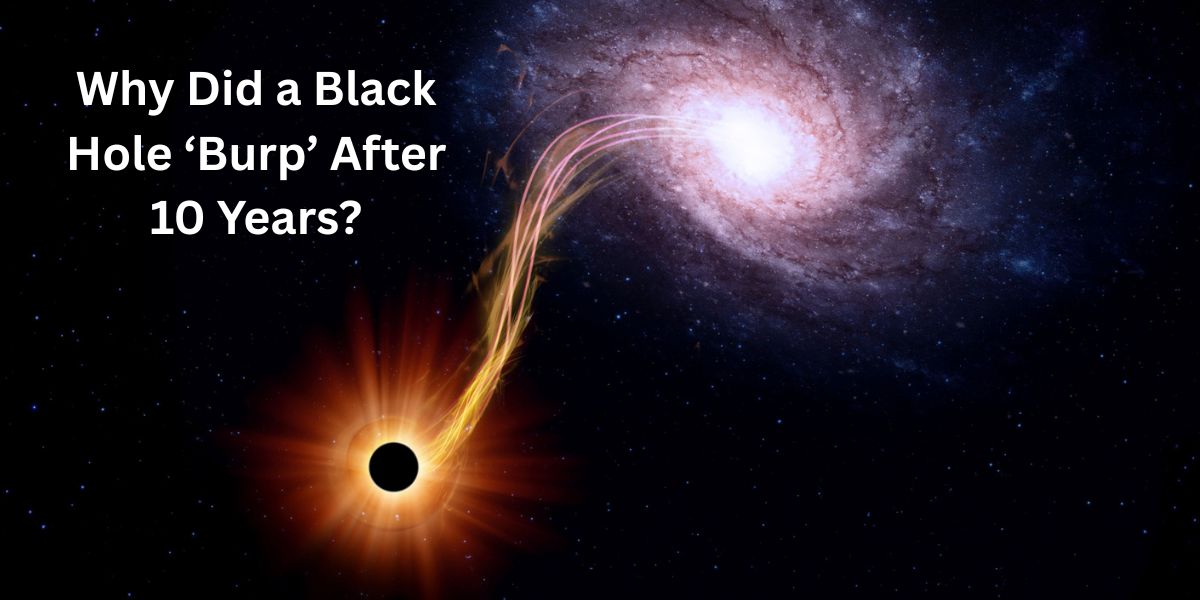Have you ever heard a black hole burp? It sounds funny, but it’s real! Scientists recently discovered a black hole that “burped” out some energy—ten years after it ate a star.
Black holes are mysterious space objects with gravity so strong that nothing, not even light, can escape them. But sometimes, they don’t just swallow things quietly. They can spit out energy, like a cosmic burp! This strange event has scientists excited.
Why did this black hole take so long to burp? Let’s find out!
What Is a Black Hole?
A black hole is a place in space where gravity is super strong. Imagine a giant vacuum cleaner pulling everything in—even light! That’s why we can’t see black holes directly.
- Formation: Most black holes form when a huge star dies and collapses.
- Size: Some are small, like a city. Others are millions of times bigger than the Sun!
- Event Horizon: The “point of no return.” If something crosses it, it’s gone forever.
Black holes usually stay quiet, but sometimes they “eat” stars or gas. When that happens, things get interesting!
What Happens When a Black Hole Eats a Star?
When a star gets too close to a black hole, it gets stretched and torn apart. Scientists call this a tidal disruption event (TDE).
- The star’s material swirls around the black hole like water going down a drain.
- Some gas escapes, but most gets pulled in.
- The black hole gets a big, hot meal—and sometimes, it burps later!
This burp is actually energy and gas shooting back out into space.
Why Did the Black Hole Burp After 10 Years?
Scientists were surprised because black holes usually burp quickly after eating. But this one waited a whole decade! Here’s why:
- Slow Digestion: The black hole might have taken years to process the star’s material.
- Leftover Energy: Some gas could have been stuck in space before falling back in.
- Magnetic Fields: Strong magnetic forces might have held the energy back before releasing it.
Think of it like eating a big meal and feeling full. Sometimes, you might burp right away—other times, it happens much later!
How Do Scientists Detect Black Hole Burps?
Black holes are invisible, but their burps give them away! Scientists use special tools to see them:
- Telescopes: Detect X-rays and radio waves from the burp.
- Computer Models: Help predict how black holes behave.
- Light Patterns: Changes in light tell scientists when a black hole is active.
This recent burp was found using old and new data. Scientists compared past observations and saw something new happening!
Is This Black Hole Burp Dangerous?
No! The burp happened far away in space—no danger to Earth.
- Distance: The black hole is millions of light-years away.
- No Effect on Us: Space is huge, so even big events don’t reach us.
- Just a Cool Discovery: Scientists study these burps to learn more about black holes.
It’s like hearing thunder from a faraway storm—you see the lightning, but it doesn’t hurt you.
What Does This Mean for Science?
This discovery helps scientists understand black holes better.
- New Theories: Maybe black holes store energy longer than we thought.
- Better Tools: Future telescopes might find more delayed burps.
- More Mysteries: Every discovery leads to new questions!
Who knows? The next black hole burp might teach us even more!
Conclusion
Black holes are full of surprises. This one waited ten years to burp after eating a star—something scientists didn’t expect. By studying these strange events, we learn more about how the universe works.
📌 Frequently Asked Questions
Can a black hole swallow Earth?
No! The nearest black hole is too far away. Earth is safe from black holes.
How big can a black hole get?
Some are small, but supermassive ones can be billions of times heavier than the Sun!
What happens if you fall into a black hole?
You’d be stretched apart—a process called “spaghettification.” (Yes, that’s a real word!)
Do black holes die?
Very slowly! They lose energy over trillions of years in a process called Hawking radiation.
How many black holes are in our galaxy?
Scientists think there are millions, but only a few have been found.
Can we see a black hole?
Not directly, but we can see their effects, like stars moving strangely around them.
What’s inside a black hole?
We don’t know! The laws of physics break down inside.
Why do black holes burp?
When they eat too much, some energy escapes as jets of gas and radiation.
How fast do black holes spin?
Some spin almost at the speed of light!
Will the Sun become a black hole?
No—it’s too small. Only very big stars turn into black holes.
